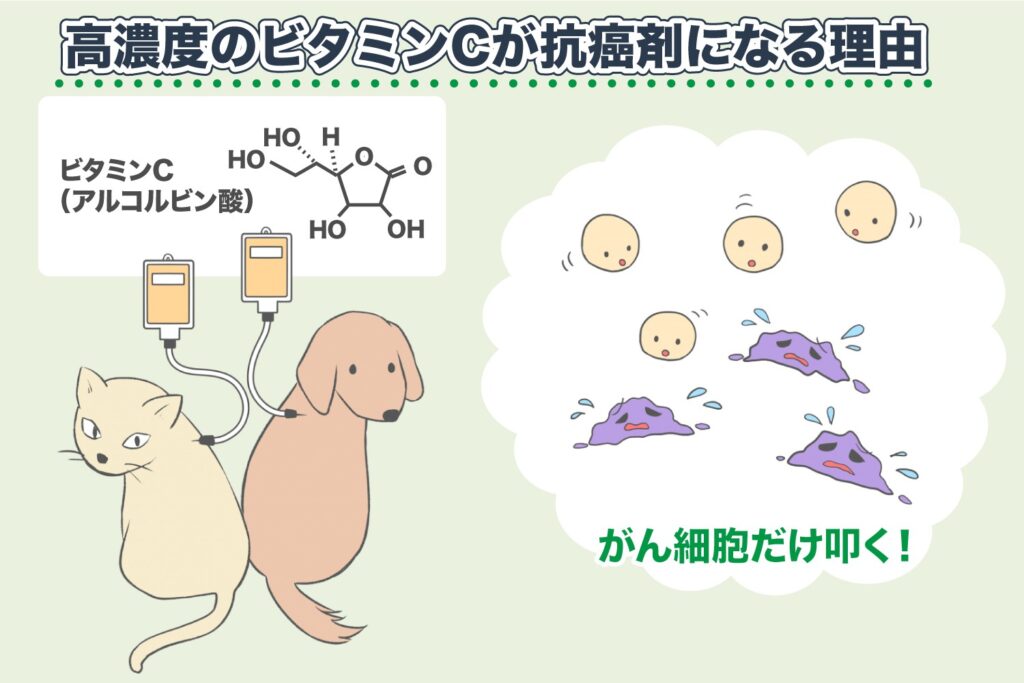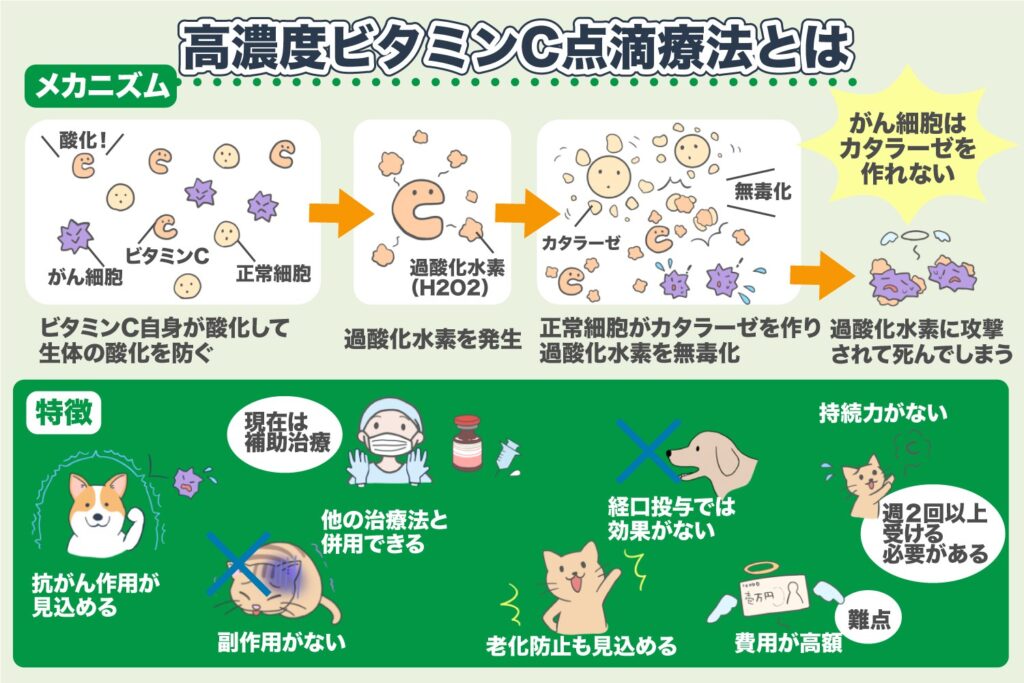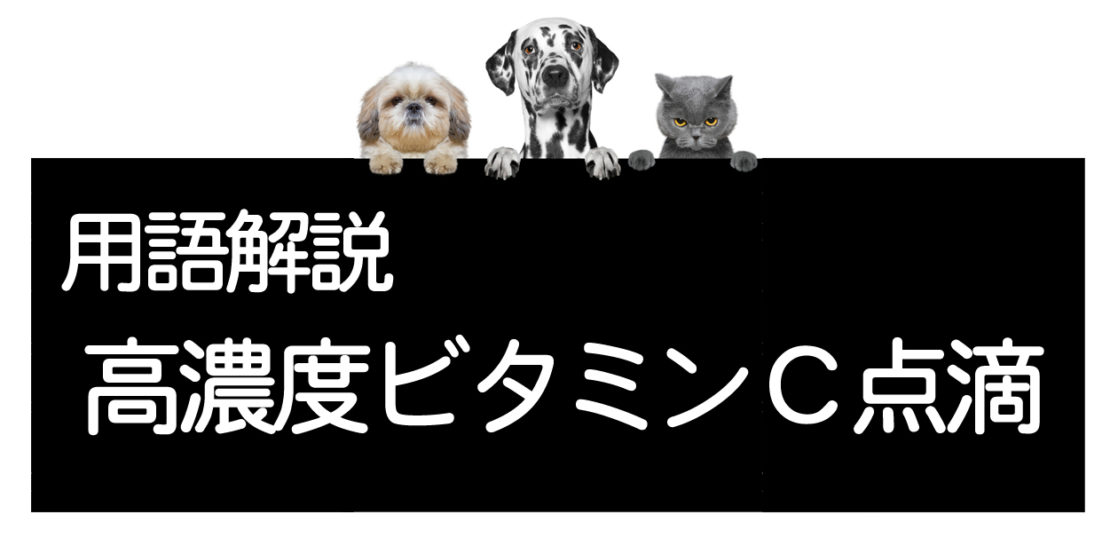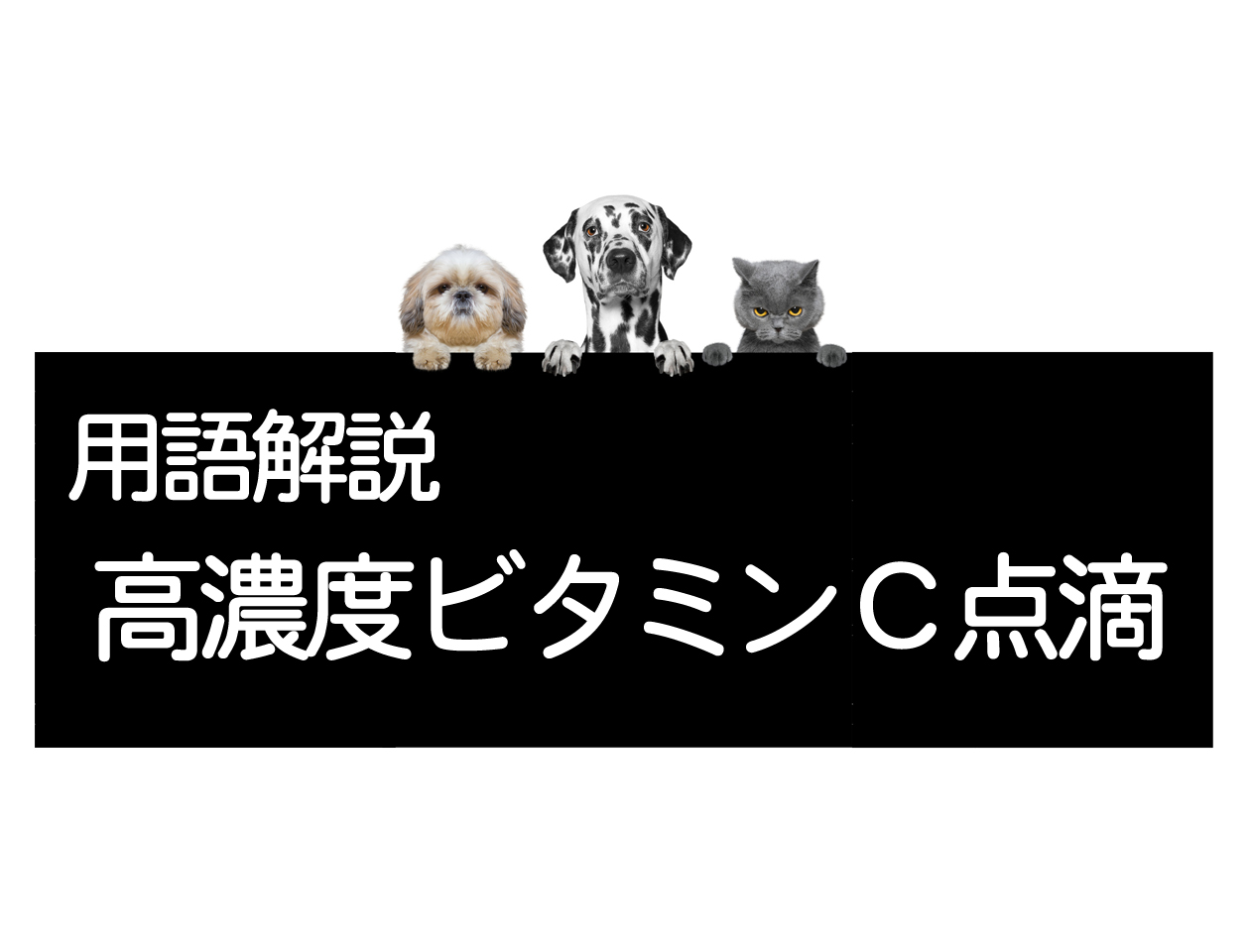目次
High-Dose Vitamin C: A Natural Anticancer Agent

It might be hard to believe for those hearing it for the first time, but vitamin C does have anticancer properties. The anticancer effects of large amounts of vitamin C are by no means weak.
The treatment itself does not require particularly advanced technology and can be performed in hospitals with reasonably equipped facilities. (Of course, training and study are necessary.)
Although there aren’t many veterinary hospitals nationwide that offer high-dose vitamin C drip therapy, why not search to see if there is one near you?
What is High-Dose Vitamin C Drip Therapy?

It’s a revolutionary and straightforward treatment method where large amounts of vitamin C (ascorbic acid) are administered via drip to selectively target and attack cancer cells. This new cancer treatment has started to be introduced in human clinics and is being adopted by some veterinary hospitals for the treatment of cancer in dogs and cats.
Features of High-Dose Vitamin C Drip Therapy
In high-dose vitamin C therapy, vitamin C is used like an anticancer agent. However, it is markedly different from conventional anticancer drugs and, when used correctly, is a treatment method with very few side effects and extremely low risk.
- Expected to have anticancer effects.
- No toxicity to normal cells, hence no worries about side effects.
- Can be combined with other treatment methods without compromising safety.
- Expected to prevent aging due to its antioxidant effects (anti-aging).
- Oral administration does not yield similar results.
- Uses a specialized vitamin C, making it relatively expensive.
- Short duration of effect.
To understand the differences from anticancer drugs, we have compiled articles on anticancer drugs for your reference.
- About Anticancer Drugs Used in the Treatment of Cancer in Dogs and Cats—Side Effects, Precautions, and More
- About Molecular Targeted Drugs Used in Cancer Treatment for Dogs and Cats
- Types and Protocols of Chemotherapy and Anticancer Drugs Used for Lymphoma in Dogs and Cats
- Trace Exposure to Anticancer Drugs – Be Careful with Anticancer Drugs During Your Pet’s Cancer Treatment
- Why Do 90% of Chemotherapy Drugs Have Side Effects?
- Chemotherapy Recommended for Dogs and Cats – What Are the Risks of Side Effects?
Mechanism of Action
Many people are aware that Vitamin C has antioxidant properties, but understanding the anticancer effects of Vitamin C requires some knowledge.
Here’s a simplified summary to make it easier to understand (although there are other mechanisms as well):
- When Vitamin C prevents oxidation in the body, it gets oxidized itself.
- Oxidized Vitamin C generates hydrogen peroxide (H2O2), a powerful oxidizing agent.
- Normal cells produce an enzyme called catalase, which instantly detoxifies hydrogen peroxide.
- In contrast, cancer cells cannot produce catalase and are attacked by hydrogen peroxide.
- Cancer cells suffer significant oxidative damage to their cell membranes and DNA, eventually leading to their death.
*Hydrogen peroxide is a potent oxidizing agent that is harmful to the body. It is also an ingredient in disinfectants (e.g., hydrogen peroxide solution).
*Catalase is an enzyme that breaks down harmful hydrogen peroxide into harmless water and oxygen.
Practical Application of High-Dose Vitamin C IV Therapy
Unfortunately, it is not effective against all cancers. It is currently positioned as an adjunctive therapy to standard treatments (surgery, radiation, and chemotherapy).
However, it can be said that even chemotherapy is not effective against all cancers. Furthermore, chemotherapeutic agents are highly toxic, and there are many cases where their use is not feasible despite their high antitumor effects. Forcing the use of chemotherapy can not only increase costs but also potentially shorten the lifespan of the patient.
While it is positioned as an adjunctive therapy, high-dose Vitamin C IV therapy may be administered alone in cases where the patient is too weak to endure standard treatments, is elderly, or if the pet owner has a strong aversion to chemotherapy.
Future of High-Dose Vitamin C IV Therapy
Treatments like high-dose Vitamin C therapy, which are highly safe and cause minimal harm to the body, are desired for animals to regain true health. If research advances and treatment outcomes improve, there is a strong possibility that it may become a mainstream and widely adopted treatment.
However, there are challenges. To achieve sufficient effects, more than two IV sessions per week are necessary. The required frequency makes the treatment costly.
Moreover, it is believed that dogs do not benefit as much from this treatment as humans do. This may be related to the fact that dogs can synthesize Vitamin C within their bodies.
However, at the very least, it may be beneficial in improving the quality of life (QOL).
Rather than treating solely with high-dose vitamin C IV therapy, incorporating other alternative therapies, such as Cordy which has immune-activating properties, to enhance the effects can lead to synergistic benefits.
Synergistic Effects with High-Dose Vitamin C IV Therapy
At Cordy Laboratory, we have received multiple reports from veterinarians in clinical settings about the synergistic effects of combining Cordy with high-dose vitamin C IV therapy.
If you have any questions, please contact us.
監修獣医師:林美彩 所属クリニック:chicoどうぶつ診療所

代替療法と西洋医学、両方の動物病院での勤務経験と多数のコルディの臨床経験をもつ。 モノリス在籍時には、一般的な動物医療(西洋医学)だけでは対応が困難な症例に対して多くの相談を受け、免疫の大切さを痛烈に実感する。
ペットたちの健康維持・改善のためには薬に頼った対処療法だけではなく、「普段の生活環境や食事を見直し、自宅でさまざまなケアを取り入れることで免疫力を維持し、病気にならない体づくりを目指していくことが大切である」という考えを提唱し普及活動に従事している。
所属:






